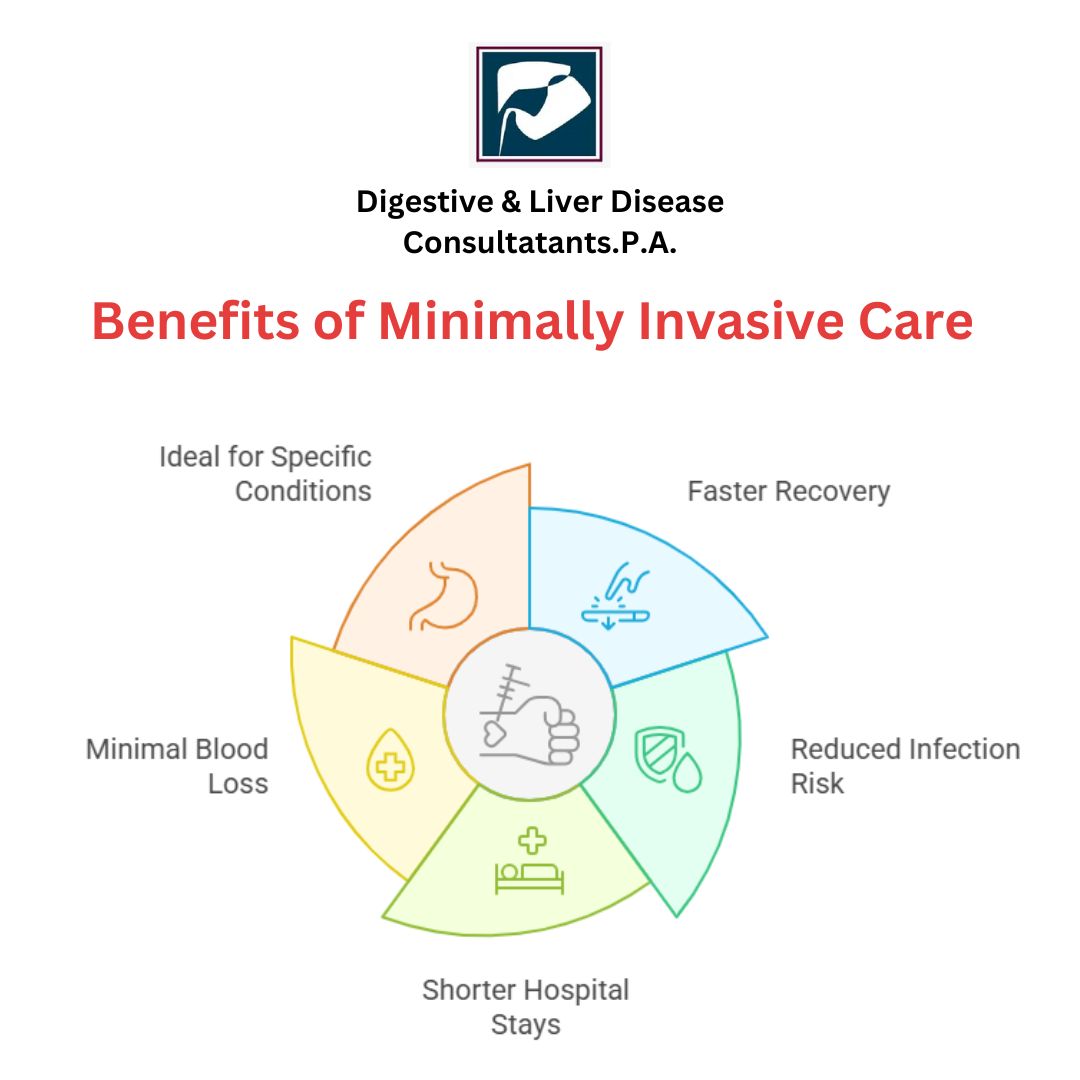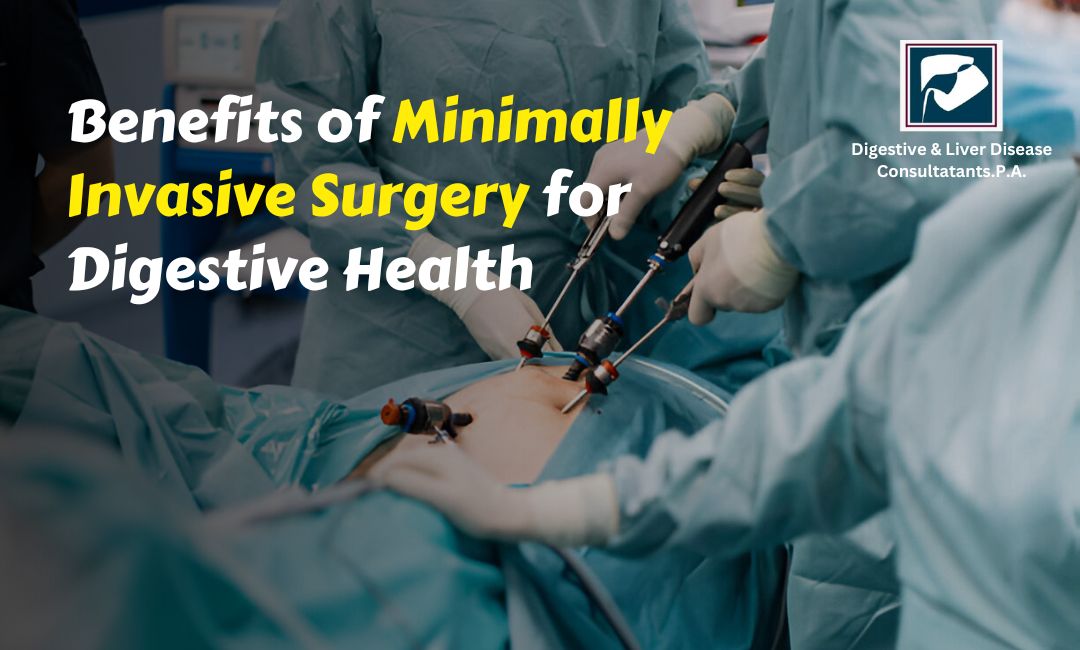When it comes to treating digestive health problems, surgery is sometimes necessary to provide relief and improve quality of life. Thanks to advancements in medical technology, many digestive surgeries can now be performed using minimally invasive techniques, offering patients a safer and more comfortable experience. At Digestive & Liver Disease Consultants, P.A., we believe in providing our patients with the latest and most effective treatment options, including minimally invasive procedures, whenever possible.
In this blog, we’ll explain what minimally invasive surgery is, how it works, and the many benefits it offers for your digestive health.
What Is Minimally Invasive Surgery?
Minimally invasive surgery is a type of procedure that uses small incisions, specialised instruments, and often a tiny camera (called a laparoscope) to perform operations inside the body. Unlike traditional open surgery, which requires large cuts and longer recovery times, minimally invasive procedures are designed to reduce damage to surrounding tissues and organs.
This approach is commonly used to treat various digestive conditions, including:
- Gallstones and gallbladder issues
- Gastroesophageal reflux disease (GERD)
- Hernias
- Colorectal problems (like diverticulitis or colon cancer)
- Liver and pancreas conditions
- Stomach ulcers

How Is Minimally Invasive Surgery Performed?
During minimally invasive surgery, the surgeon makes a few small incisions, usually no more than half an inch long. Through these openings, the surgeon inserts thin instruments and a laparoscope, which sends real-time images to a screen in the operating room. This allows the surgeon to carefully perform the necessary procedure without making a large cut.
Some minimally invasive surgeries may also involve robot-assisted technology, where the surgeon controls robotic arms with high precision, improving the accuracy and safety of complex procedures.
Key Benefits of Minimally Invasive Surgery for Digestive Health
Minimally invasive surgery has transformed the way many digestive disorders are treated. Here are some of the biggest benefits:
1. Smaller Incisions
One of the most noticeable advantages is the size of the incisions. Instead of a large surgical cut, patients only need a few tiny incisions. This reduces the risk of infection, minimises scarring, and improves the overall cosmetic outcome.
2. Less Pain and Discomfort
Because there’s less cutting and disturbance of surrounding tissues, patients typically experience less pain after minimally invasive surgery. This means a lower need for pain medications and a more comfortable recovery.
3. Shorter Hospital Stays
In most cases, patients who undergo minimally invasive digestive surgeries can go home much sooner than those who have traditional open surgery. Some procedures may even be performed on an outpatient basis, allowing patients to return home the same day.
4. Faster Recovery
With smaller wounds and less trauma to the body, recovery times are often much quicker. Many patients can resume light activities within a few days and return to their normal routine in a few weeks, compared to several months after open surgery.
5. Lower Risk of Infection
Smaller incisions mean fewer chances for bacteria to enter the body, which lowers the risk of postoperative infections. This leads to safer outcomes and fewer complications.
6. Minimal Scarring
Since minimally invasive surgeries require only tiny cuts, the scars left behind are much smaller and less noticeable than those from traditional open surgery. This is especially beneficial for patients concerned about the cosmetic appearance of surgical scars.
7. Improved Precision
Advanced technology like high-definition cameras and robotic assistance gives surgeons a clearer view and greater control during the procedure. This leads to more accurate results, less damage to healthy tissues, and better overall outcomes.
Conditions Treated with Minimally Invasive Digestive Surgery
Minimally invasive surgery is used to treat a wide range of digestive health conditions, such as:
- Gallbladder removal (Cholecystectomy) for gallstones and inflammation
- Hiatal hernia repair to correct stomach acid reflux problems
- Colectomy for colon cancer, diverticulitis, or inflammatory bowel disease
- Liver cyst or tumour removal
- Appendectomy for appendicitis
- Weight-loss (bariatric) surgery for obesity-related digestive issues
How to Prepare for Minimally Invasive Digestive Surgery
Before your procedure, your doctor will review your medical history, perform tests, and discuss the details of your surgery with you. You’ll receive specific instructions about:
- What to eat or drink before surgery
- Which medications to avoided
- How to prepare your digestive system (for example, a liquid diet or bowel prep may be needed)
- Following these guidelines helps ensure a smooth surgery and recovery.
Life After Minimally Invasive Surgery
After your minimally invasive digestive surgery, you’ll likely be encouraged to start moving around soon to prevent blood clots and promote healing. Your care team will provide advice on:
- Dietary changes
- Wound care
- Activity restrictions
Most patients feel better much sooner compared to traditional surgery, and many report a quick return to their normal energy levels and activities.
Why Choose Digestive & Liver Disease Consultants, P.A.?
At Digestive & Liver Disease Consultants, P.A., we are proud to offer advanced, patient-centred care for a wide range of digestive and liver disorders. Our experienced team includes board-certified gastroenterologists and surgeons who specialise in minimally invasive techniques. We use the latest tools and technologies to ensure that our patients receive safe, effective, and personalised treatment plans.
Whether you’re dealing with gallstones, acid reflux, or a more complex digestive issue, we’re here to help you feel better and get back to the life you love. Our goal is to provide compassionate care with the best possible outcomes for every patient.
Conclusion
Minimally invasive surgery has changed the way digestive conditions are treated, offering patients faster recoveries, less pain, and better cosmetic results. If you’ve been diagnosed with a digestive disorder that requires surgery, ask your doctor if a minimally invasive approach is right for you.
If you’re experiencing digestive health problems or have been told you may need surgery, contact Digestive & Liver Disease Consultants, P.A. today.






